-
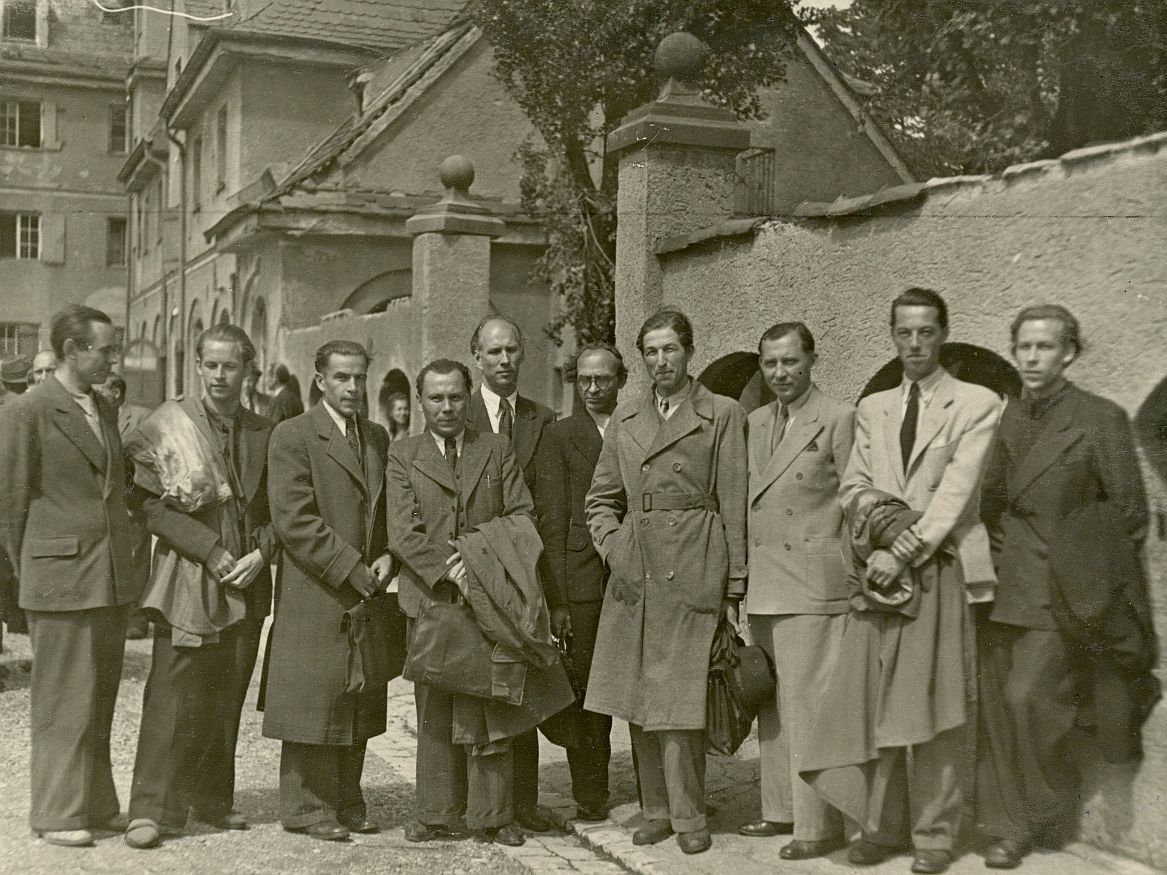
The participants of the first congress of Lithuanian Refugee Authors’ Association. From left: the artist P. Osmolskis A. Nyka-Niliūnas B. Gražulis, K. Bradūnas, S. Santvaras, B. Brazdžionis, S. Lenktaitis (owner of the publishing house Patria), V. Ramonas, A. Škėma and H. Nagys. Photo by Don Šulaitis.
The Lithuanian Writers’ Association was revived January 25-26, 1946, in Tübingen, Germany, under the name of Lithuanian Refugee Authors’ Association. Tübingen was not chosen by chance. In 1946, the Association’s publication Pranešimai (News) writes that “the majority of writers happened to flock to Tübingen and its surroundings. Last fall, the first steps were taken towards the publication of the writers’ chronicle Metai (Years). During one of its meetings, the editorial board decided to organize a writers' congress.”
-
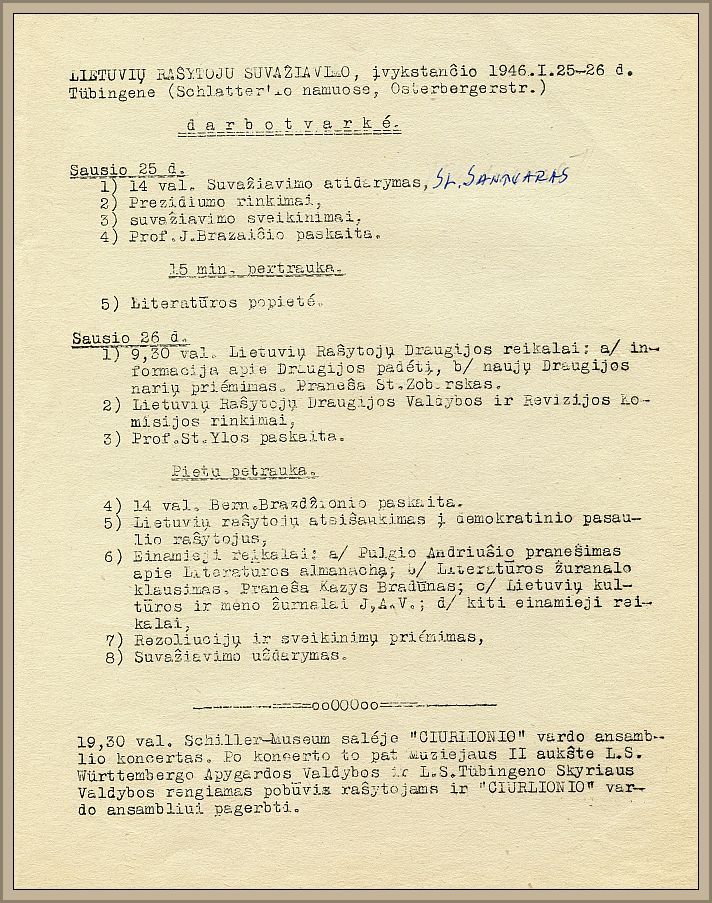
The agenda of the first LRA’s Congress held on January 25-26, 1946.
During the first congress, the Board of Directors, the Executive Committee, and the Board of Review were elected. The participants discussed new business, approved proclamations, resolutions, and greetings. Prof. Juozas Brazaitis, prof. Stasys Yla, and Bernardas Brazdžionis delivered lectures. A literary event was organized that afternoon and the 100-th concert of the Čiurlionis ensemble took place in the evening.
-
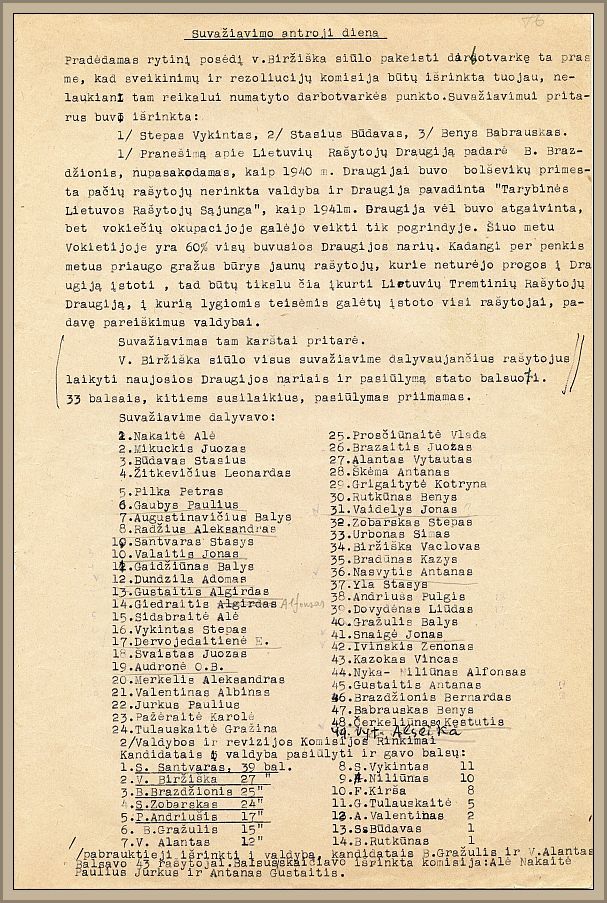
A list of attendees at the first Lithuanian Refugee Authors’ Congress.
During the war, about 60 percent of all Lithuanian Writers’ Association members settled in Germany. According to the poet Bernardas Brazdžionis, one of the presenters at the congress, “During the last five years an impressive group of young writers has matured, who did not get the chance to join the Association at home. Thus it would make sense to establish the Lithuanian Refugee Authors’ Association here, which all writers could join on an equal basis by applying to the board of directors.” Vaclovas Biržiška’s proposal to accept all congress participants into the new organization was approved by a majority. In this way, the congress united Lithuanian writers scattered in dozens of DP camps in Germany.
-
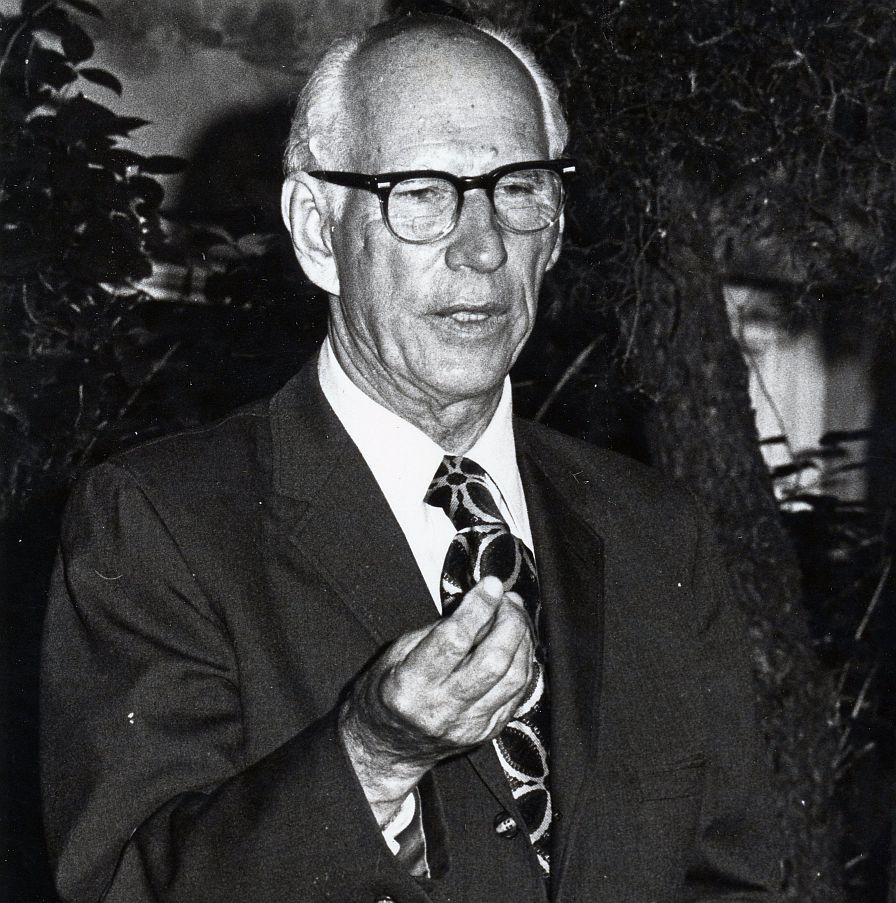
Stasys Santvaras, the first chairman of the Lithuanian Refugee Authors’ Association. Photo by Č. Čikotas.
From the revival of the Lithuanian Refugee Authors’ Association, until 1949, it was headed by Stasys Santvaras. Other Board members were Vaclovas Biržiška, Bernardas Brazdžionis, Stepas Zobarskas, and Pulgis Andriušis.
-
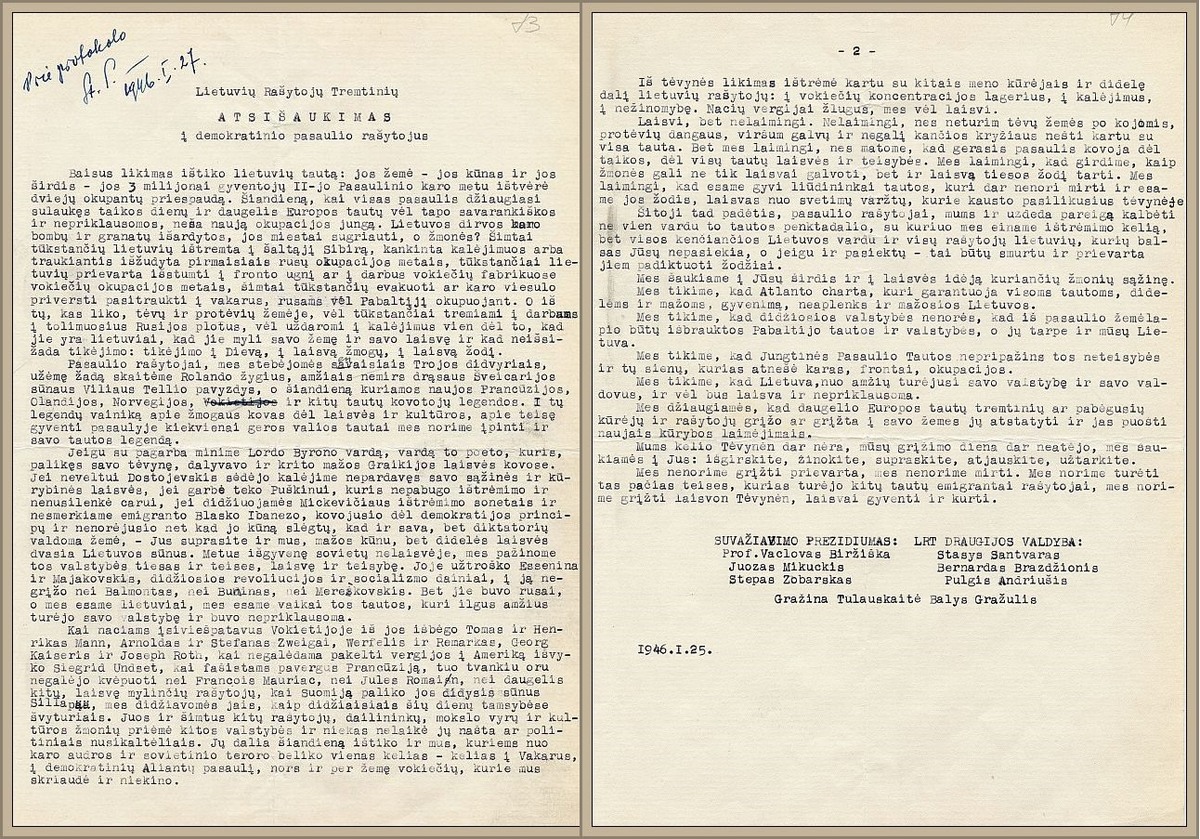
Lithuanian Refugee Authors’ appeal to the writers of the democratic world, January 25-26, 1946.
The participants of the first congress voiced a suggestion to send an appeal to the writers of the democratic world. After Brazdžionis expressed doubt whether it was the right time to take such a step, a heated debate broke out. However, “after lengthy discussions, it was decided to sign the appeal and Bernardas Brazdžionis reads the text, which is received by enthusiastic applause.” (An excerpt from the minutes of the first congress) Later the Association’s chairman, Santvaras, would acknowledge that “the appeal only received attention in France, Italy, and Germany.”
-
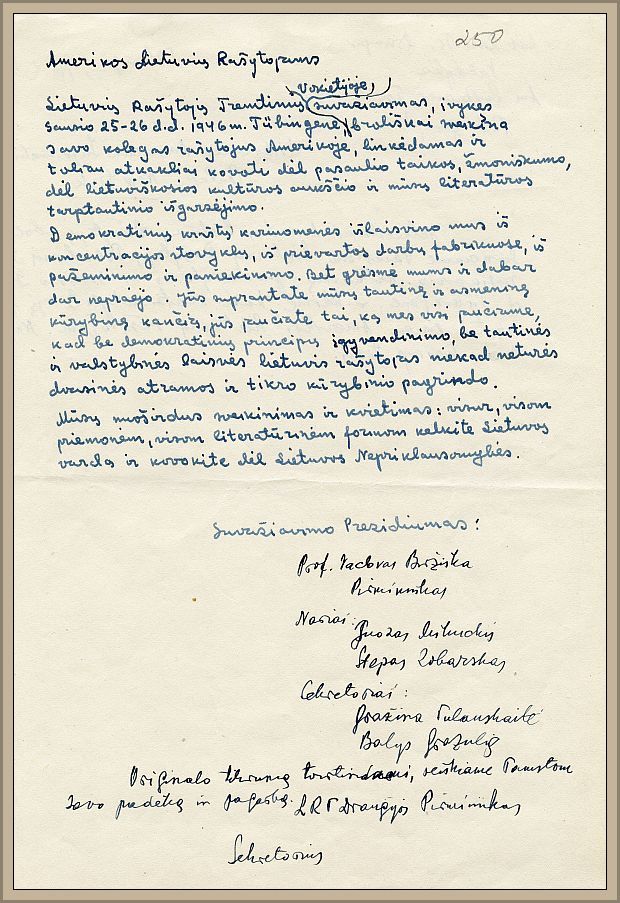
Letter of greeting to American Lithuanian writers.
The first congress also sent letters of greeting to the Supreme Committee for the Liberation of Lithuania, the Lithuanian Red Cross, the United Lithuanian Relief Fund of America, Lithuanian American Council, Lithuanian American press, and Lithuanian writers in the US, France, and Sweden. “Our sincere greetings and an invitation to raise the name of Lithuania everywhere, in every way, by all literary forms and to fight for Lithuania's independence,” we read in the greeting to Lithuanian writers in the US.
-
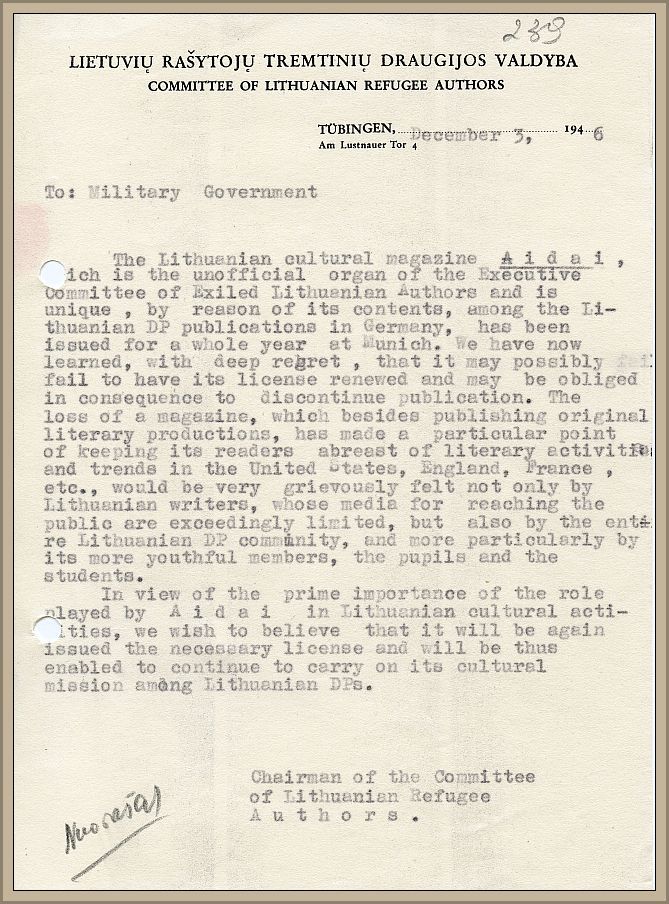
Copy of Santvaras’ letter to the American Military Government regarding the magazine “Aidai.”
When West Germany was divided among the Allies in 1945, Lithuanians living in DP camps found themselves in different zones – American, French, or English. Each zone had different laws and regulations to follow, for example: permits were required for organizing event, for publishing Lithuanian newspapers, books, and etc. On December 3, 1946, Santvaras, chairman of the Board of Directors, contacted the American Military Government, requesting a permit to continue publishing the culture magazine Aidai (Echoes) in Munich. Aidai, edited by Kazys Bradūnas, eventually received the necessary authorization and later became the unofficial publication of the Lithuanian Refugee Authors’ Association.
-
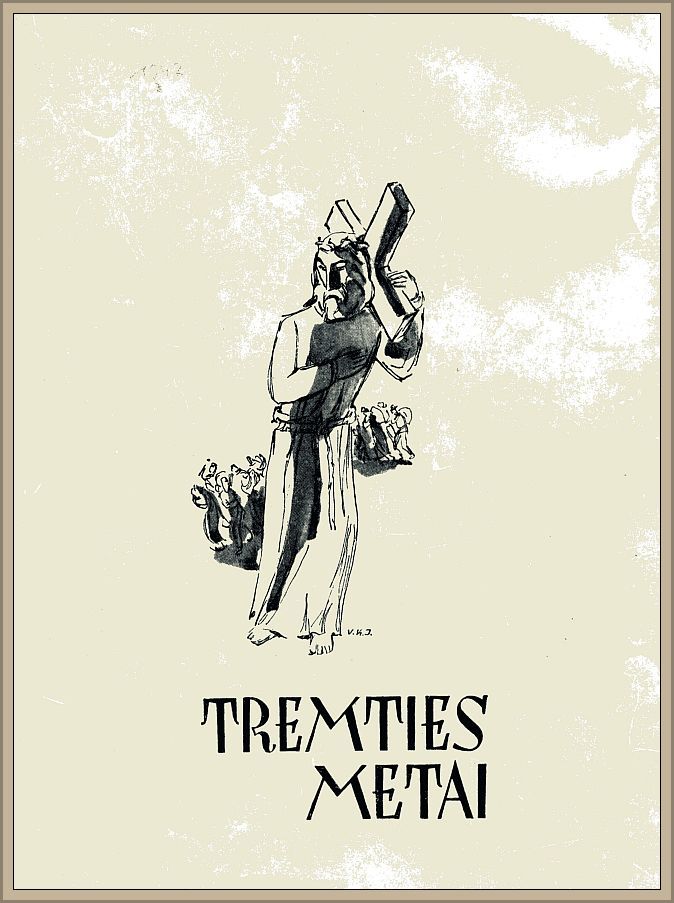
LRA’s chronicle “Tremties metai” (Tübingen: Patria, 1947).
Almost immediately after its revival, the Association began to organize the commemorations for the 400-year anniversary of the first Lithuanian book. A publication, Tremties metai (Years of Exile), was devoted to this occasion. It was prepared not by a small group of writers belonging to a single literary movement, but by a communal effort. The book, edited by Brazdžionis and published by Patria in 1947, succeeded in involving 70 writers. In the books’ forward, Santvaras wrote: “... if we were in Independent Lithuania, we would have marked this cultural anniversary with more lasting and worthy published material. But our forces are divided and our units are scattered. We enter the public with severely thinned ranks. But we go united and with greater hope and faith than ever in the resurrection of the Lithuanian nation and its genius.” Though a similar book was planned for the following year, this idea was never realized.
-
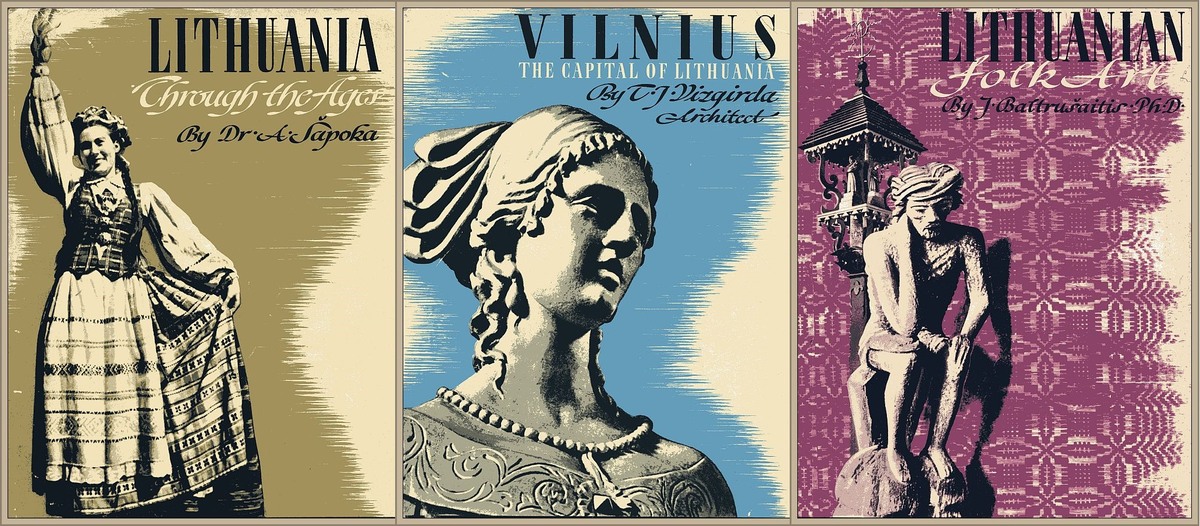
Three exceptional books in English appeared in 1948, Lithuania Through the Ages by A. Šapoka, Vilnius, The Capital of Lithuania by T.J. Vizgirda, and Lithuanian Folk Art by J. Baltrušaitis. All three were part of the series “Lithuania: Country and Nation.”
In addition to the literary magazine, which had never materialized, and the chronicle, mentioned in no. 8, the Board of Lithuanian Refugee Authors’ Association also planned to publish translations of Lithuanian literature and to present Lithuanian culture to the world. Though this was already emphasized at the first congress, it took several years for results to appear. In 1947-1948, a number of books were published in English and German on topics of Lithuania’s history, Lithuanian folk art, and Lithuanian artists in exile.
-
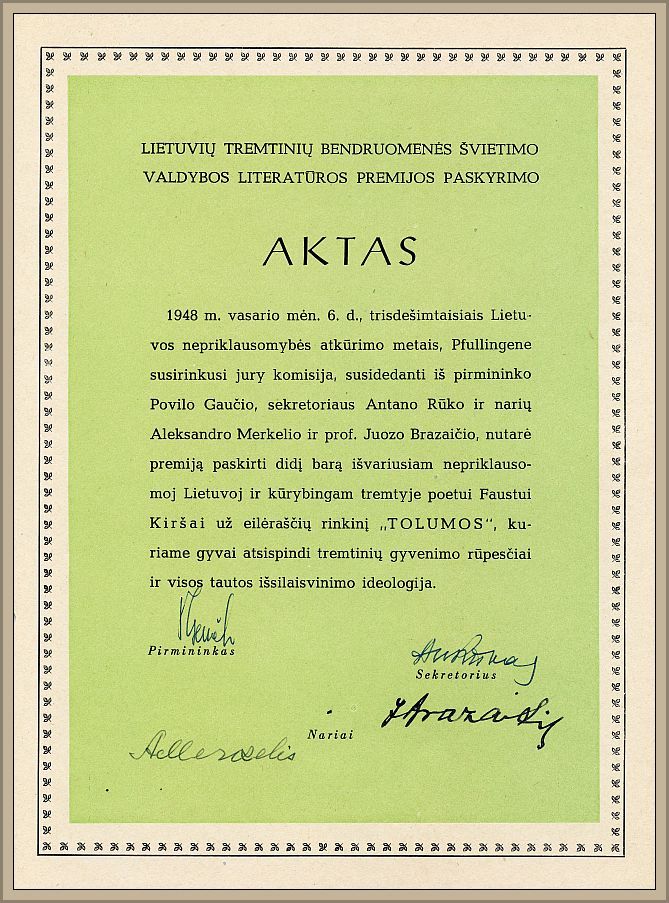
In 1948, the Board of Education of the Lithuanian Exile Community award for literature was given to Faustas Kirša for his poetry collection Tolumos [Distances].
The Lithuanian Refugee Authors’ Association also revived the presentation of annual awards for Lithuanian literary works. Prizes were provided by three institutions – the Board of Education of the Lithuanian Exile Community, the United Lithuanian Relief Fund of America and the Lithuanian Red Cross. Among the recipients awarded while in Germany were B. Brazdžionis, F. Kirša, J. Jankus, A. Nyka-Niliūnas, V. Ramonas, N. Mazalaitė, K. Bradūnas, P. Andriušis, and J. Kaupas.
-
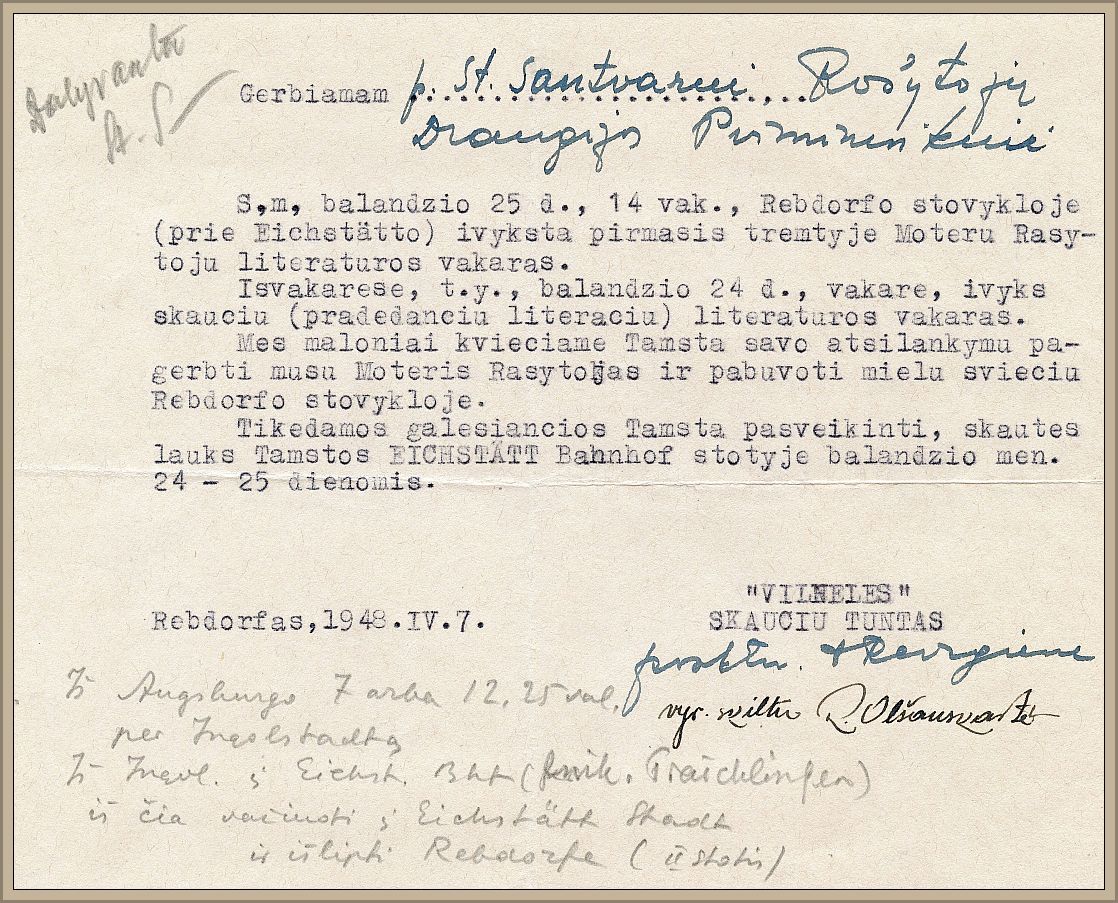
The Lithuanian Girl Scout troop’s invitation to board chairman Santvaras.
The Lithuanian Refugee Authors’ Association organized literary afternoons, evenings, and commemorations, and its members eagerly participated in literary festivals organized in the Lithuanian DP camps. One such literary event took place in the camp at Rebdorf, near Eichstätt in 1948. It was the first literary soiree for Lithuanian women writers, organized by the local Girl Scout troop, Vilnelė.
-
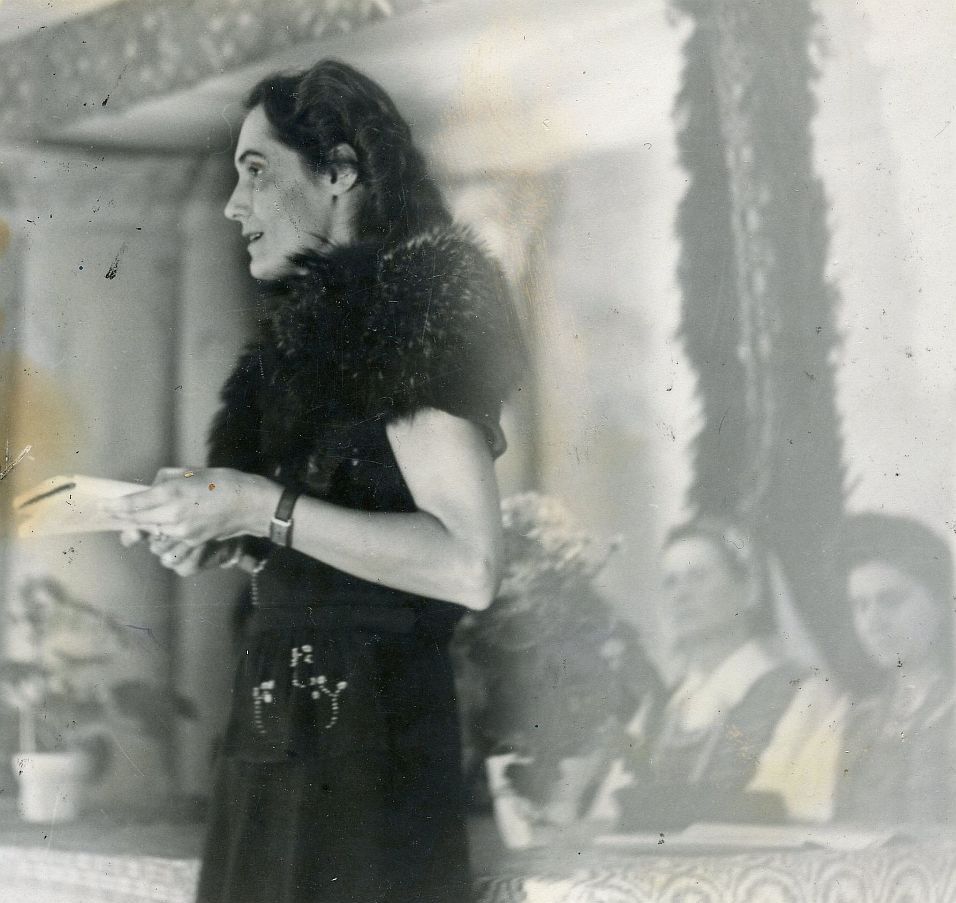
One of the participants of the literary soiree at Rebdorf. Photo by J. Gaidys.
Participants in the first literary soiree for Lithuanian women writers in exile were: Juzė Augustaitytė-Vaičiulienė, O.B. Audronė (Ona Balčiūnienė), Nelė Mazalaitė-Kruminienė, Kotryna Grigaitytė-Graudušienė, Petronėlė Orintaitė-Janutienė, Magdalena Mykolaitytė, Vlada Proščiūnaitė, Karolė Pažėraitė and Gražina Tulauskaitė.
-
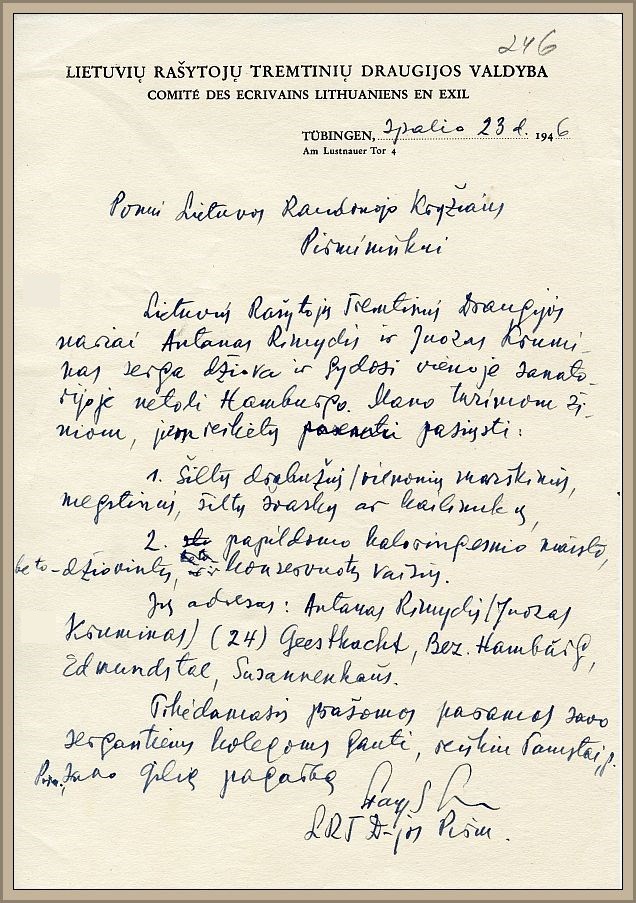
Santvaras’ letter to the president of the Lithuanian Red Cross.
The Lithuanian writers’ organization in exile concerned itself not only with publishing and distributing Lithuanian literature, organizing literary events and celebrations, but also looked after its members, providing them with benefits, certificates of employment, and etc. In a letter dated October 23, 1946, the organization’s chairman Santvaras wrote to the president of the Lithuanian Red Cross, requesting warm clothes and food for Antanas Rimydis and Juozas Kruminas, who were being treated for tuberculosis.
-
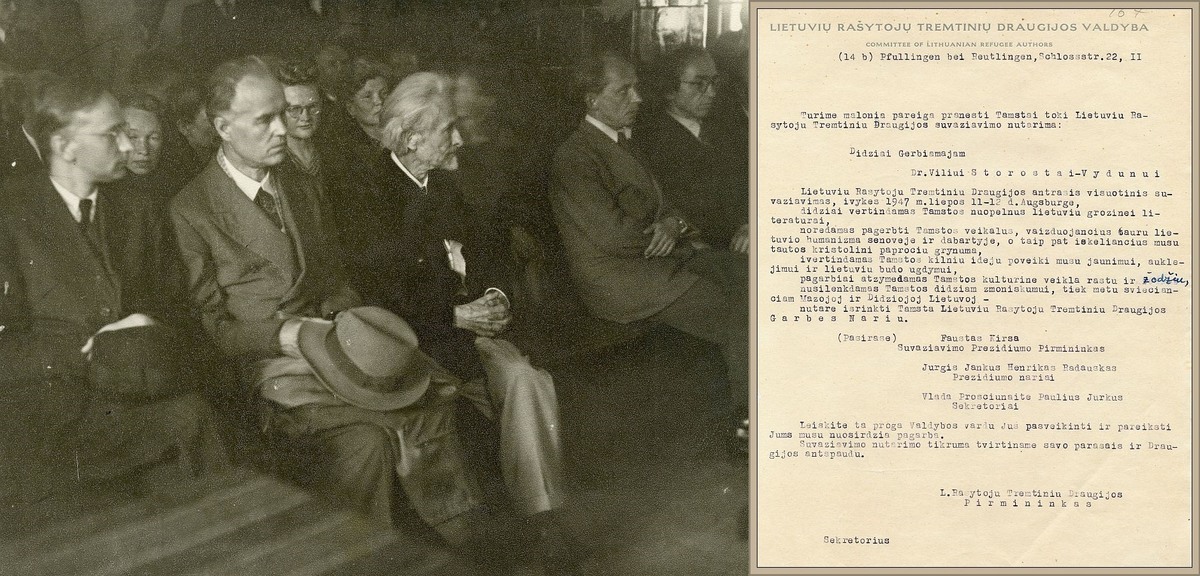
The congratulatory letter to Vydūnas on becoming an honorary member of the LRA. Vydūnas (third from left) at the first congress of LRA. Photo by Don Šulaitis.
The participants of the second congress, which took place on July 11-12, 1947 in Augsburg, selected as honorary members of the Association: Vincas Krėvė, Vilhelm Storosta-Vydūnas, Mykolas Vaitkus and Juozas Vilkutaitis-Keturakis. In response to the congratulatory message, Vydūnas wrote: “... I say a heartfelt Thank you. Yet reading why it [the honor] was given to me, it would seem that too much was said about my endeavors. Therefore I am obliged, as much as I am still able, to continue working and justify the honor you bestowed upon me.”
-
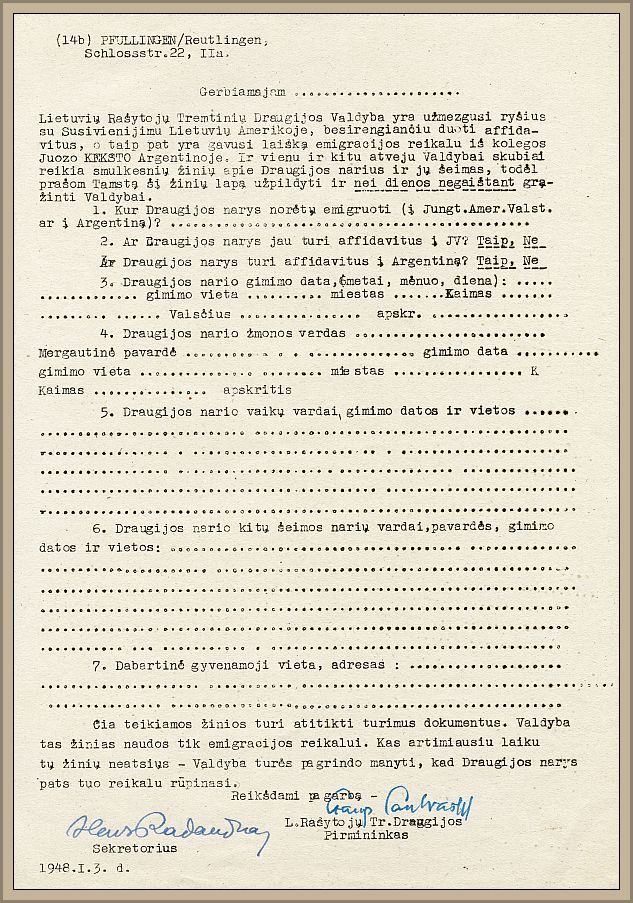
Chairman Santvaras’ statement to members of organization who wish to emigrate to the United States or Argentina.
The years of 1948 and 1949 marked the beginning of DP emigration to North America, South America, and Australia. The Lithuanian Refugee Authors’ Association tried to help their members receive official invitations, also called affidavits for emigration abroad. Assistance was requested from contacts in the US and Argentina in providing jobs and housing for members. The activities of the writers’ organization started to slow in 1948 and as noted by Dr. D. Kuizinienė, publishing of Lithuanian books and press dropped significantly during that year.
